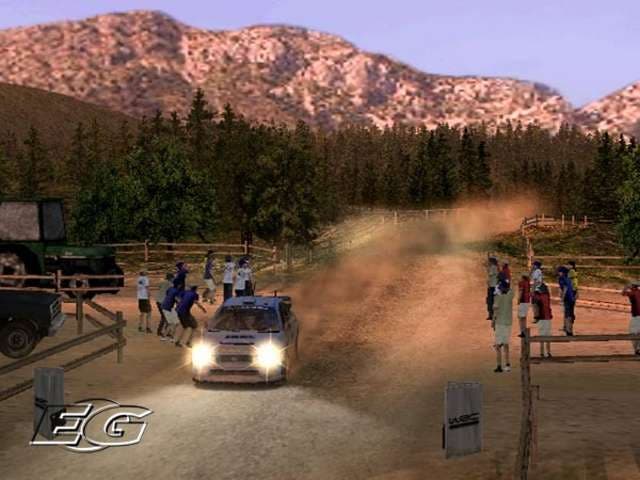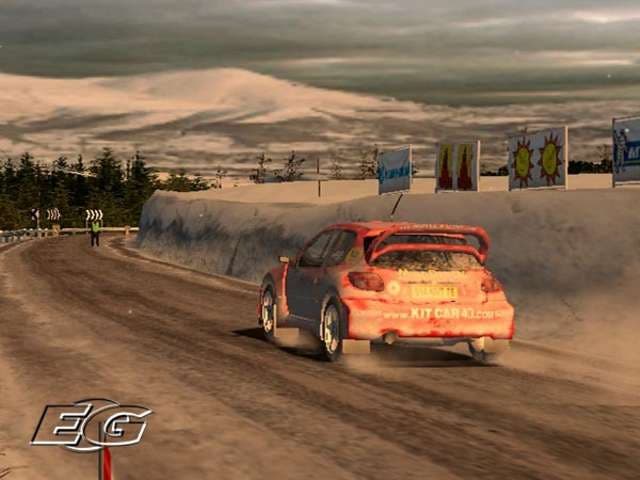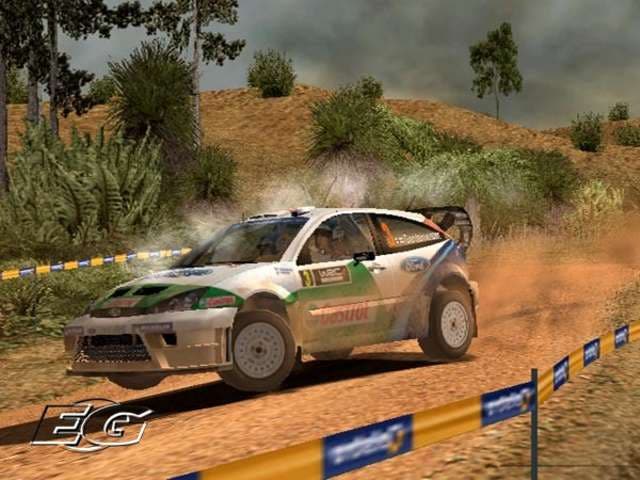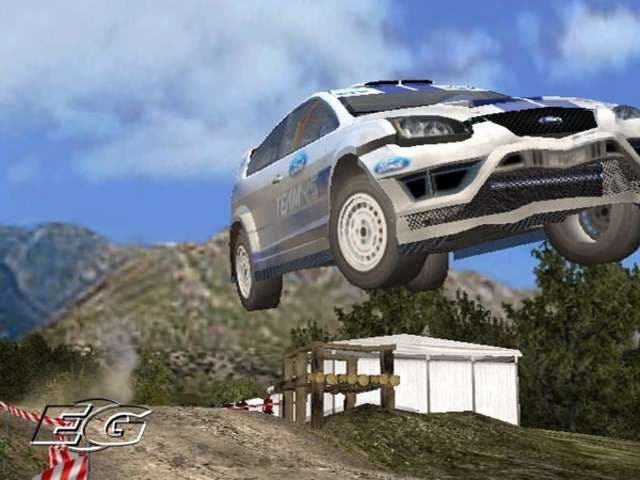WRC Rally Evolved
Not the paradigm (gear) shift its suffix evidently seeks to suggest.
With its actual racing engine pushing all the right pedals, it's alarming to discover that WRC: Rally Evolved suffers from what can only be described as an identity crisis. That it's clearly designed to appeal to as broad an audience as possible isn't an issue. However, it appears to have been crafted with the execrable "mainstream gamers = idiots" equation in mind, the insulting assumption that casual players will be sent screaming from the room by any hint of complexity or difficulty.
Not long into my first championship, I discovered that the three new driving aids added to this release - steering assist, traction control and braking assist - are not merely activated, but set to maximum by default. There's no attempt to ascertain your level of experience, no forewarning, no attempt to even loosely tie these settings to difficulty levels. Traction control is understandable, but that WRC helps you to, italics indicating disbelief, brake and steer as standard is an inexplicable decision. Disable or reduce the driving aids, set the steering sensitivity to 'slow' (this is probably a subjective thing, but the default setting feels unnaturally twitchy), and keeping your car on the track becomes the appreciably technical test of skill and judgement that you would expect from a rally game.

That the driving aids are activated is a minor inconvenience, granted, but a symptom of a wider problem. Obsessed with ease of use and accessibility, Evolution has made a number of bizarre decisions. Take the damage system, for example. Hit a tree at full speed, and you can reasonably expect your vehicle's performance to be impaired. Problematically, it doesn't make a great deal of difference. When your co-driver announces that there's engine damage after a collision, you might notice a slight drop in acceleration or top speed, but little more. Even a handful of serious smashes won't hold you back - indeed, it seems that the only way to really wreck your car in any meaningful way is by making a concerted effort to repeatedly crash, or through abject ineptitude.
When your car sustains damage, there's a quick detour to a screen where you can implement repairs before the next stage. With twenty minutes to spend on maintenance, and a harsh thirty-second time penalty for each subsequent five minutes with the bonnet up, this initially seems like an interesting tactical element: you know, making sacrifices, planning ahead, strategising. Actually, it works as follows:
- Select "auto repair".
- Select "exit".
- Done.
Elapsed time: 2.3 seconds. Be still, my beating heart.

Not once, while playing properly at least, did I ever sustain damage that took more than the twenty-minute allocation to repair - and, as much as I enjoy them, I'll admit that I'm by no means an expert at playing driving games. It appears that, with due irony, the only people who will actually need to consider which repairs to make (potentially suffer the punitive time penalties and, of course, not unthinkingly select the quick-fix 'auto repair' option) are... drum roll... people who are truly awful.
What does WRC: Rally Evolved want to be? A quick, slippery fix like Sega Rally? A sim like Richard Burns Rally? One thing that must be said, though, is that it's lovely to behold. The sheer detail and variety throughout its sixteen different real-world locales is worthy of all the usual superlatives. It engenders a real sense of driving through an environment, rather than merely following a prescribed route through a tunnel with strictly defined boundaries. It's all an illusory veneer, of course - leave the track at high speed, or attempt to explore, and WRC returns you to the course abruptly. This can be infuriating. On more than one occasion, you'll find an attempt to make what seems like a reasonable shortcut is, well, cut short by WRC's overzealous propensity for teleporting you back to a static position on the beaten path when you venture from it. Still, though: it looks and feels right, from particle effects to backdrops, glorious downhill stretches to treacherous cliffside tracks.
Actually, there's seldom opportunity to admire the scenery as it flashes by. As well as watching out for oncoming corners, you immediately begin to appreciate the need to keep a keen eye on the road. These aren't simple flat surfaces infused with variables that dictate that they're slippy, or bumpy, or suchlike. You can actually see that, say, the camber of the left side of a road is askew, that large stones are scattered on the track ahead, or that there's a slight ridge that could complicate matters if you hit it too fast while negotiating a routine 'five right'. There's a clear relationship between cause and effect. As annoying as it can be when you lose control of your vehicle, you can rarely feel indignant: the visual cues and clues are all there.

At its best, WRC: Rally Evolved's course design encourages drivers to take risks, but punishes overconfidence and lapses in concentration. There's a very tangible difference between how the car reacts when you're pushing hard and when you're holding something back. You find that you're constantly evaluating every section, easing off on a bumpy straight that cries for flat-out acceleration because a split-second flash of intuition advises caution, or deciding to hurl the car aggressively around a hairpin bend that, as you suspect, looks more dangerous than it actually is. It's an innately visceral experience, obviously, but good judgement and forethought matters.
While you can still use crash barriers and walls as braking aids when required - a flaw common to the vast majority of racing games - WRC: Rally Evolved has destructible trackside furniture. Despite its credentials as a simulation, even Gran Turismo 4 allows players to "wall-ride" - that is, grind a car against a crash barrier to, for example, navigate a tight bend. WRC cleverly discourages this practice. There are plenty of solid, immutable objects that will halt a slide abruptly, but - as a rule - you can't use them effectively as 'rails'. Furthermore, less substantial fences are destroyed on contact: you can't rely, as once was the case, on a flimsy plastic barrier to halt a high-speed skid over a ledge. There's a definite emphasis on maintaining control of your vehicle. Knowing that you can't simply carom from one track-boundary to the next, even inexperienced players will find that they dedicate more care and attention to staying on the road.
Sadly, beyond losing time and falling behind on the next split, WRC fails to engender any sense that crashes are a meaningful event. Hurtle from a ledge at 80mph, and you can find yourself teleported back on the track and accelerating, without damage, within a blink of an eye. Wrestle with an uncontrollable slide that doesn't cause you to stray from the road, however, and you're on your own until you hit something, or manage to fashion a recovery. The inconsistency is maddening: it doesn't make sense that you can be punished more for clipping a fence post than hurtling off the track towards trees that, to all intents and purposes, don't effectively exist. Unless you play on the higher two of the four difficulty levels (the topmost of which demands precise - nay, exacting - performances), there just don't seem to be any real consequences. On the lower two, you can lose control several times during a stage, and still win comfortably. It's like a game of musical chairs where the seating arrangements are left as they are throughout.

One really interesting idea, and the principal 'new' feature in this annual update, is the Interactive Event System. With this, you can encounter various hazards - such as the crashed vehicle of a rival driver, rocks dropping onto the track, unconvincingly animated animals - that, being unexpected, can add spice to a stage. As very occasional occurrences, these would be highly welcome. Sadly, after encountering a dozen or more stricken rally cars within a relatively short space of time, it's hard not to reflect that it's an embarrassing contrivance that every driver that crashes or suffers engine failure should do so on your run, and so regularly. On one level, it's a fine concept implemented too aggressively; on another, it's like a tacit acknowledgement that the developers feel that maybe, just maybe, the thrill of thundering along torturously twisting gravel courses has somehow become devalued as a source of entertainment.
But it hasn't: on the track, pushing hard to make up a couple of seconds in the last section of a race, WRC: Rally Evolved can be just as exhilarating as any of its peers, past or present. It's lovely to look at, technically sound, and blessed with too many pleasing touches to recount here. Equally, though, its structure is woefully unimaginative, and no amount of throwaway gimmicks can disguise that fact. WRC's online functionality is great, but it has a lousy championship system (three races per rally just isn't enough - just as you get to grips with the surface and environment, it's over), a Rally Cross mode that feels eminently disposable in singleplayer, and a series of short challenges that, as entertaining as they may be, are a direct lift from the Gran Turismo series. WRC just isn't as good as it so easily could and should be. I'd trade every single Interactive Event, half the stages, all of the unlockable (also: disposable) bonus features and practically all of the cars for a solid career/championship mode and, more pertinently, a damage system that introduced a sense of danger to accompany the urgency of each race.
Evolved? Yes - but only in the "process by which something passes by degrees to a different stage" sense.
